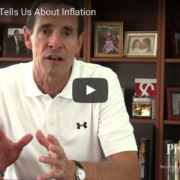Own or Loan? Equities vs. Bonds
With interest rates on the rise, we’ve had an uptick in people asking us about bonds and whether it makes sense to re-evaluate fixed income in a portfolio. For readers of my column, you might remember that I’m not a fan of bonds for one simple reason: The payment amount is fixed. While some see this as a reason to invest in bonds, I see it as a major problem. Here’s why: As everything around us continues to get more expensive, a fixed payment covers less and less of the goods and services we need as life goes on.
Inflation is a headwind for us all, but for those heavily invested in bonds it becomes a prison sentence. A $100,000 investment in a hypothetical bond that may pay, say, 5%, means you’ll have $105,000 at the end of the year. But if inflation keeps humming along at 6%, that $105,000 will only buy you roughly $99,000 worth of stuff. That’s not exactly my definition of a winning investment. It may be secure, but it’s not “safe.”
Beyond the sheer economics of fixed payments versus dividends, there’s another reason I prefer equities (ownership in a company via stocks) over bonds (loaning money to a company). Theoretically, if a smart business wants a loan, it’s because they think they can generate a return that’s higher than their cost of borrowing that money. For example, if they take out a loan at 5%, they must expect to convert that money into a return of over 5%. A yield less than that doesn’t make sense.
As an investor, this gives me options. I can either attempt to lock in my return at the lower amount offered by the bond, or I can seek a greater potential return by purchasing ownership in a company via their stock. Over time, owners have far outpaced loaners, as evidenced by the long-term historical return of bonds at 3% (after inflation) compared to the long-term return of equities at over 7% (after inflation) according to Seeking Alpha.
So what’s the catch? In exchange for the premium returns from owning businesses, investors must be willing to ride out temporary declines. They must accept the increased volatility that accompanies equities.
That’s why my team see ourselves as behavioral investment counselors. Our goal is to ready our clients for the inevitable, historically temporary equity market declines of 10 to 15% every 12 to 18 months, 30% every 5 years or so, and 50% every 10 to 20 years or so. These dips over time have become “normal.” But the long-term upward path of great companies is almost always positive—whether measured by their earnings, dividends or value.
Anyone who’s 50 years old has lived through a near 50% decline no less than three times (January ‘73 to October ‘74 dropping 48%, March ’00 to October ‘02 dropping 49%, and October ‘07 to March ‘09 dropping 57%). This extreme volatility is what scares investors away from equities, or sometimes the market altogether. Yet when you look at the historical facts, each of these declines was temporary. The broad markets dropped, sometimes for a couple of years, before they eventually established new highs.
Even in just the last three years, we’ve seen this trend play out. We’ve experienced a 100-year global health crisis, a 33% market drop in just 30 days, a 19% contraction in US GDP, a 40% increase in the money supply, the sharpest increase in the Federal Reserve interest rate ever, and a 40% increase in inflation according to Yahoo Finance. Yet the S&P 500 is about 20% higher (as of June 9) than in February of 2020 before all this started. It’s simply astonishing.
Temporary declines are just that, temporary. Nobel laureate Daniel Kahneman tells us that losing money feels twice as bad as making money feels good. The pain of loss causes people to want to flee ownership and instead loan their money, temporarily bringing relief since bonds are thought to be less volatile. This theory doesn’t always prove true, however. Bonds have been subject to far more volatility of late thanks to changing interest rates.
Though each investor’s situation is different, we believe the advantage of owning businesses far outweighs the advantage of loaning to those businesses. Rational leaders work to protect and grow the capital of their company’s shareholders. Their purpose is to work toward earning a superior return. This is why ownership makes so much sense and is far superior in my opinion.
We believe owning successful companies for the long run, rather than lending to them, is a sound way to seek to protect the purchasing power of your dollars and potentially grow your wealth over time. We encourage investors to speak with their financial advisor about owning shares in the very best businesses in the world, whose products and services we purchase regularly and use each and every day. Your goal should be a portfolio that grows income and endures for generations.
Steve Booren is the Owner and Founder of Prosperion Financial Advisors, located in Greenwood Village, Colo. He is the author of Blind Spots: The Mental Mistakes Investors Make and Intelligent Investing: Your Guide to a Growing Retirement Income and a regular columnist in The Denver Post. He was recently named a Barron’s Top Financial Advisor and recognized as a Forbes Top Wealth Advisor in Colorado.
All performance referenced is historical and is no guarantee of future results.
All indices are unmanaged and may not be invested into directly.
Investing involves risk, including possible loss of principal.
Securities and advisory services offered through LPL Financial, a registered investment advisor. Member FINRA/SIPC.







